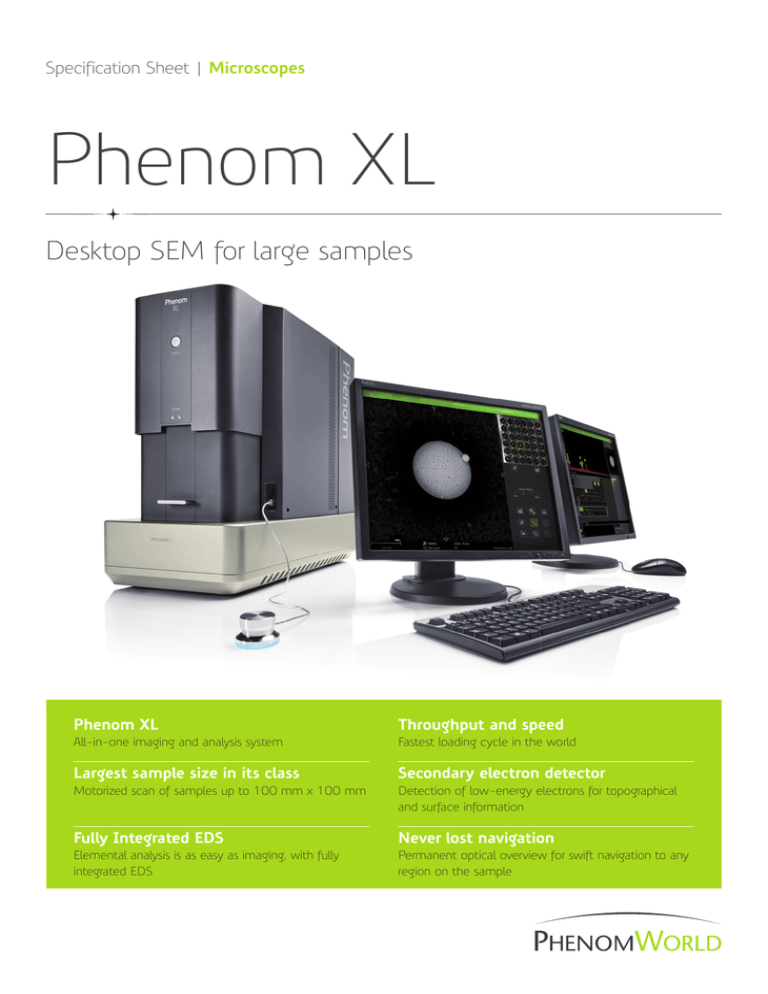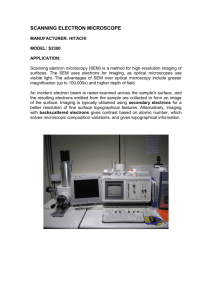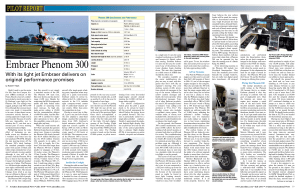
Specification Sheet | Microscopes
Phenom XL
Desktop SEM for large samples
Phenom XL
Throughput and speed
All-in-one imaging and analysis system
Fastest loading cycle in the world
Largest sample size in its class
Secondary electron detector
Motorized scan of samples up to 100 mm x 100 mm
Detection of low-energy electrons for topographical
and surface information
Fully Integrated EDS
Never lost navigation
Elemental analysis is as easy as imaging, with fully
integrated EDS
Permanent optical overview for swift navigation to any
region on the sample
The Phenom XL Scanning Electron Microscope (SEM) pushes the boundaries of compact desktop SEM performance. It features the
proven ease-of-use and fast time-to-image of any Phenom system. It is also equipped with a chamber that allows analysis of large
samples up to 100 mm x 100 mm. A proprietary venting/loading mechanism ensures the fastest vent/load cycle in the world, providing
the highest throughput. A newly developed compact motorized stage enables the user to scan the full sample area, and yet the Phenom
XL is a desktop SEM that needs little space and no extra facilities. Ease-of-use is given an extra boost in the Phenom XL with
a single-shot optical navigation camera that allows the user to move to any spot on the sample with just a single click – within seconds.
Phenom XL
The Phenom XL features a newly designed chamber including
a compact motorized stage that allows analysis of samples of
up to 100 mm x 100 mm. In spite of this much larger sample
size, a proprietary loading shuttle keeps the vent/load cycle to
a minimum, which in practice enables a throughput that is a
few factors higher than any comparable SEM system. The user
interface is based on the proven ease-of-use technology already
applied in the successful Phenom Pro and ProX desktop SEM. The
interface enables both existing and new users to quickly become
familiar with the system without much training. The standard
detector in the Phenom XL is a four-segment BackScatter
Detector (BSD) that yields sharp images and provides chemical
contrast information. The Phenom XL can be equipped with two
optional detector systems. The first one is a fully integrated EDS
system for elemental analysis. The second option is a Secondary
Electron Detector (SED) that enables surface sensitive imaging.
The ProSuite software application platform is also available for
the Phenom XL. With the ProSuite software, and applications
such as ParticleMetric, PoroMetric, FiberMetric and 3D Roughness
Reconstruction the user can further analyze samples.
Imaging Specifications
Imaging modes
>Light optical
>Electron optical Magnification range: 3 - 16x
Magnification range: 80 - 100,000x
Digital zoom max. 12x
Illumination detector
>Light optical Bright field / dark field modes
>Electron optical Long-lifetime thermionic source (CeB6)
Multiple beam currents
>Acceleration voltages Default: 5 kV, 10 kV and 15 kV
Advanced mode: adjustable range between 4,8 kV and 15 kV imaging
and analysis mode Secondary
Electron Detector
>Resolution ≤ 20 nm
Detector
>Standard >Optional 02
BackScatter Detector
Secondary Electron Detector
Specification sheet | Phenom XL
Digital image detection
>Light optical Proprietary high-resolution color
navigation camera, single shot
>Electron optical High-sensitivity BackScatter
Detector (compositional and topographical modes)
Image formats JPEG, TIFF, BMP
Image resolutation
options 456 x 456, 684 x 684, 1024 x 1024
and 2048 x 2048 pixels
Data storage USB flash drive
Network
ProSuite PC
Sample Stage Computer-controlled motorized X and Y
Sample size Max. 100 mm x 100 mm
(up to 36 x 12 mm pin stubs)
Max. 65 mm (h)
Scan area 50 mm x 50 mm
100 mm x 100 mm (optional)
Sample loading time
>Optical <5s
>From optical to SEM < 60 s
Elemental analysis can be added by EDS technology already proven on the Phenom ProX. Energy Dispersive Spectroscopy (EDS)
allows users to analyze the chemical composition of their samples. Detailed chemical composition can be obtained from a micro
volume via a spot analysis. Elemental distribution can be visualized with the elemental mapping option. An optional Secondary
Electron Detector (SED) is available for applications that require surface and topography sensitive imaging.
Step-by-step data collection
The dedicated software package Element Identification (EID) is
used to control the fully integrated EDS detector. Analysis has
become as easy as imaging, since there is no need to switch
between external software packages or computers. The CeB6
electron source in the Phenom is used to generate the highest
X-ray count rate in its market segment, allowing fast results.
The EID software package allows the user to identify nearly
all materials in the periodic table, starting from Boron (5) and
ranging up to Americium (95). It is a perfect analysis tool for a
wide range of samples and applications.
Projects can be stored locally or on the network, where they
can be analyzed at a later stage or offline.
The EID software package runs smart algorithms with advanced
peak analysis to optimize the auto-identification functionality,
while still allowing for manual adjustments by the user at any
time in the analysis process.
The intuitive step-by-step process within the software helps
the user to collect all X-ray results in an organized and
structured way
EDS Specifications
System Specifications
Detector type
Silicon Drift Detector (SDD)
Thermoelectrically cooled (LN2 free)
>Detector active Area 25 mm2
>X-ray windowUltra-thin Silicon Nitride (Si3N4)
window allowing detection of elements
B to Am
>Energy resolution
Mn Kα ≤ 137 eV
>Processing capabilitiesMulti-channel analyzer with 2048
channels at 10 eV/ch
>Max. input count rate 300,000 cps
>Hardware integration Fully embedded
Dimensions & Weight
>Imaging module
316(w) x 587(d) x 625(h) mm, 75 kg
>Diaphragm
vacuum pump
145(w) x 220(d) x 213(h) mm, 4.5 kg
>Power supply
156(w) x 300(d) x 74(h) mm, 3 kg
>Monitor
375(w) x 203(d) x 395(h) mm, 7.9 kg
>ProSuiteStandard ProSuite System including:
19” monitor with PC and network
router mounted
375(w) x 250(d) x 395(h) mm, 9 kg
SoftwareIntegrated in Phenom ProSuite
Integrated column and stage control
Auto-peak ID
Iterative strip peak deconvolution
Confidence of analysis indicator
Export functions: CSV, JPG, TIFF,
ELID, EMSA
Ambient conditions
>Temperature
15°C ~ 30°C (59°F ~ 86°F)
>Humidity
< 80% RH
>PowerSingle phase AC 110 - 240 Volt,
50/60 Hz, 300 W (max.)
Report
Requirements
Recommended
table size 150 x 75 cm, load rating of 100 kg
Docx format
Specification sheet | Phenom XL
03
Elemental Mapping and Line Scan
The Elemental Mapping functionality visualizes the distribution
of elements throughout the sample. The selected elements can
be mapped at a user-specified pixel resolution and acquisition
time. The real time mapping algorithm shows live build-up of
the selected elements. For a user, it is simply click-and-go to
work with the Elemental Mapping and Line Scan functionality of
the Phenom desktop SEM.
The Line Scan functionality shows the quantified element
distribution in a line plot. This is especially useful for coatings,
paints and other applications with multiple layers. All results of
both the Elemental Mapping and Line Scan functionality can be
easily exported by using an automated report template.
Secondary Electron Detector
The standard detector in the Phenom XL is a four-segment
BackScatter Detector (BSD) that yields sharp images and
provides chemical contrast information.
A Secondary Electron Detector (SED) is optionally available on
the Phenom XL. The SED collects low-energy electrons from the
top surface layer of the sample. It is therefore the perfect choice
to reveal detailed sample surface information. The SED can be of
great use for applications where topography and morphology are
important. This is often the case when studying microstructures,
nanostructures or particles.
Elemental Mapping & Line Scan Specifications
SED Specifications
Elemental Mapping
>Element selection Detector type
10 individual user-specified maps, plus backscatter image
and mix-image
Backscatter image and mix-image
>Selected area Any size, rectangular
>Mapping resolution range 16 x 16 - 512 x 512 pixels
>Pixel dwell time range 10 - 250 ms
Line Scan
>Line Scan
resolution range 16 – 512 pixels
>Points dwell time range 50 – 250 ms
>Total number of lines 12
Report Docx format
Phenom-World BV, Dillenburgstraat 9E, 5652 AM Eindhoven, The Netherlands, www.phenom-world.com
©2015. Specifications and prices are subject to change without notice. All rights reserved. Reproduction, copying, usage,
modifying, hiring, renting, public performance, transmission and/or broadcasting in whole or in part is prohibited without
the written consent of Phenom-World BV. Find your Phenom-World contact information at www.phenom-world.com
Everhart Thornley






